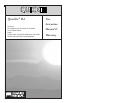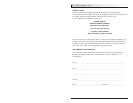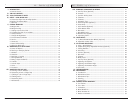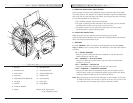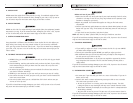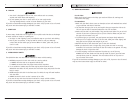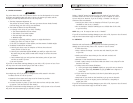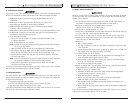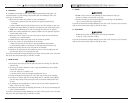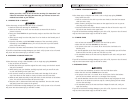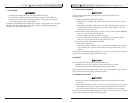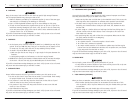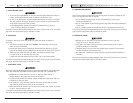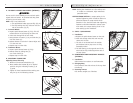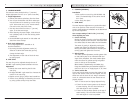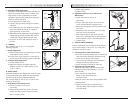
930398 Rev. B
VI. Warnings: Falls & Tip-Overs
13
C. WHEELIES
Doing a “wheelie” means: balancing on the rear wheels of your chair while
the front casters are in the air. It is dangerous to do a “wheelie” as a fall or
tip-over may occur. However, if you do it safely, a “wheelie” can help you
overcome curbs and obstacles.
1. Consult your doctor, nurse or therapist to find out if you are a good
candidate to learn to do a “wheelie.”
2. Do not attempt a “wheelie” UNLESS you are a skilled rider of this chair,
or you have help.
NOTE– See p. 18 for steps to learn to do a “wheelie.”
If you fail to heed these warnings damage to your chair, a fall, tip-over or loss of control
may occur and cause severe injury to the rider or others.
D. OBSTACLES
Obstacles and road hazards (such as potholes and broken pavement) can
damage your chair and may cause a fall, tip-over or loss of control.
To avoid these risks:
1. Keep a lookout for danger – scan the area well ahead of your chair
as you ride.
2. Make sure the floor areas where you live and work are level and
free of obstacles.
3. Remove or cover threshold strips between rooms.
4. Install a ramp at entry or exit doors. Make sure there is not a drop-off at the
bottom of the ramp.
5. To Help Correct Your Center Of Balance:
a. Lean your upper body FORWARD slightly as you go UP over an obstacle.
b. Press your upper body BACKWARD as you go DOWN from a higher to a
lower level.
6. If your chair has anti-tip tubes, lock them in place before you go UP
over an obstacle.
7. Keep both of your hands on the handrims as you go over an obstacle.
8. Never push or pull on an object (such as furniture or a doorjamb) to
propel your chair.
If you fail to heed these warnings damage to your chair, a fall, tip-over or loss of control
may occur and cause severe injury to the rider or others.
VI. Warnings: Falls & Tip-Overs
930398 Rev. B
12
A. CENTER OF BALANCE
The point where this chair will tip forward, back or to the side depends on its center
of balance and stability. How your chair is set up, the options you select and the
changes you make may affect the risk of a fall or tip-over.
1. The Most Important Adjustment Is:
The position of the rear wheels. The more you move the rear wheels forward,
the more likely your chair will tip over backward.
2. The Center Of Balance Is Also Affected By:
a. A change in the set-up of your chair, including:
• The distance between the rear wheels.
• The amount of rear wheel camber.
• The seat height and seat angle.
• Backrest angle.
b. A change in your body position, posture or weight distribution.
c. Riding your chair on a ramp or slope.
d. The use of a backpack or other options, and the amount of added weight.
3. To Reduce The Risk Of An Accident:
a. Consult your doctor, nurse or therapist to find out what axle and
caster position is best for you.
b. Consult your authorized supplier BEFORE you modify or adjust this chair.
Be aware that you may need to make other changes to correct the center
of balance.
c. Have someone help you until you know the balance points of your chair
and how to avoid a tip-over.
d. Use anti-tip tubes.
If you fail to heed these warnings damage to your chair, a fall, tip-over or loss of con-
trol may occur and cause severe injury to the rider or others.
B. DRESSING OR CHANGING CLOTHES
Your weight may shift if you dress or change clothes while seated in this chair.
To reduce the risk of a fall or tip-over:
1. Rotate the front casters until they are as far forward as possible.
This makes the chair more stable.
2. Lock anti-tip tubes in place. (If your chair does not have anti-tip tubes, back it
up against a wall and lock both rear wheels).
If you fail to heed these warnings damage to your chair, a fall, tip-over or loss of control
may occur and cause severe injury to the rider or others.



